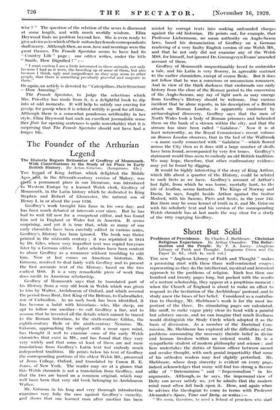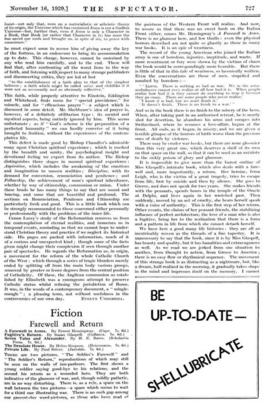Short But Solid
THE new " Anglican Library of Faith and Thought " makes a promising start with these three well-contrasted essays ;
representing as they do the intellectual, mystical and historical approach to the problems of religion. Each less than one hundred and twenty pages long, but packed with the results of a mature scholarship, they appear at a propitious moment : when the Church of England is about to make an effort to respond to the invitation of the Archbishops' pastoral, and to study anew the bases of her belief. Considered as a contribu- tion to theology, Mr. Shebbeare's work is far the most im- portant of the three. Its stimulating pages are calculated, like snuff, to make vague piety clear its head with a painful but salutary sneeze, and we can imagine that much liveliness would distinguish the Study Circle which adopted it as the basis of discussion. As a member of the Doctrinal Com- mission, Mr. Shebbeare has explored all the difficulties of the problems surrounding the necessary theistic belief in divine and human freedom within an ordered world. He is a sympathetic student of modern philosophy and science ; and here undertakes the duties of liaison officer between sacred
and secular thought, with such genial impartiality that some of his orthodox readers -may feel slightly perturbed. Mr. Shebbeare, whose deep sincerity is evident on every page, indeed acknowledges that many will, find too strong a flavour
alike of " Determinism " and- Impersonalism " in his arguments. Although, as he says, the impersonal view of Deity can -never satisfy us, yet he admits that the modern mind must often- fall back .upon it. Here, and again when -he advises the- theologian' to comp to terms with Professor
Alexandeis,Space, Time and Deity, qn,writes " We seem, therefore, to need a School of preachers who shall insist—not only that, even on a materialistic or atheistic theory of its origin, the Universe which has contained Jesus is not a Godless Universe—but, further that, even if Jesus is only a Character in a Book, that Book (or rather that Character in it) Was none 'the less saved our souls and brought us, in spite of sin, to peace with conscience."
he must expect some to accuse him of giving away the key of the fortress, in an endeavour to bring its accommodation
Up to date. This• charge, however, cannot be sustained by any who read him carefully, and to the end. These will find that, after confronting all the worst lions in the way of faith, and listening withrespect to many strange pathfinders and disconcerting critics, they are led at last
" to the establishment of a faith akin to that of the simplest believer ; a faith which might be called naive and childlike if it were not so necessarily and so obviously reflective."
This faith, while properly attentive to Einstein, Eddington and Whitehead, finds room for special providence," for miracle, and for " efficacious prayer "—a subject which is discussed in some detail. Mr. Shebbeare's idea of prayer is, however, of a definitely utilitarian type : its mental and mystical aspects, being entirely ignored by him. This seems unfortunate ; as if God's scheme is the preparation of a perfected humanity " we can hardly conceive of it being brought to fruition, without the experiences of the contem- plative life.
This defect is made good by Bishop Chandler's admirable essay upon Christian spiritual experience ; which is marked by the breadth and sanity, the psychological insight and devotional feeling we expect from its author. The Bishop distinguishes three stages in normal spiritual experience : Aspiration, which includes the awakening of the emotions and imagination to unseen realities ; Discipline, with its demand for conversion, renunciation and penitence ; and Fellowship, the achievement of man's spiritual inheritance, whether by way of citizenship, communion or union. Under these heads he has many things to say that are sound and bracing, and some that are beautiful and profound. The sections on Renunciation, Penitence and Citizenship are particularly fresh and good. This is a little book which can be strongly recommended to those concerned either personally or professionally with the problems of the inner life.
Canon Lacey's study of the Reformation removes us from the contemplation of eternal realities, and immerses us in temporal events, reminding us that we cannot hope to under- stand Christian theory and practice if we neglect its historical side. His pages are packed with information, much of it of a curious and unexpected kind ; though some of the facts given might change their complexion if seen through another pair of spectacles. He regards the Reformation as, in origin, a movement for the reform of the whole Catholic Church of the West ; which through a series of tragic blunders merely ended by splitting off from the main body various groups, removed by greater or lesser degrees from the central position of Catholicity. Of these, the Anglican communion as estab- lished by Elizabeth was a courageous attempt to preserve Catholic status whilst refusing the jurisdiction of Rome. It was, in the words of a contemporary document, a " mingle- mangle " ; a pleasing term, not without usefulness in the
controversies of our own day. EVELYN UNDERHILL.









































 Previous page
Previous page